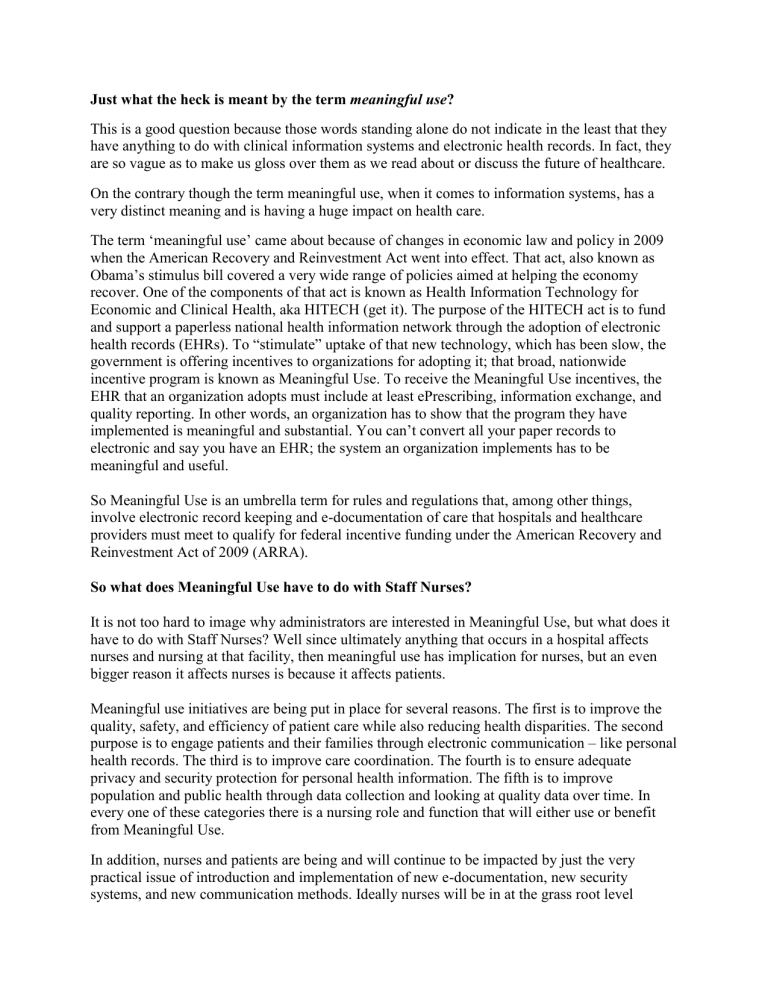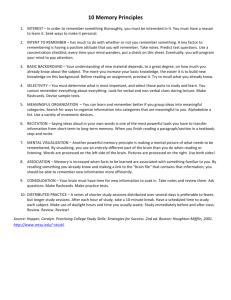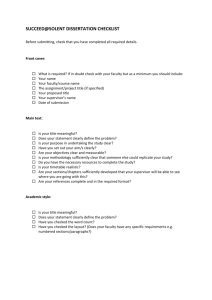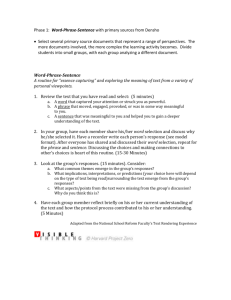What is meant by the term meaningful use (new

Just what the heck is meant by the term meaningful use?
This is a good question because those words standing alone do not indicate in the least that they have anything to do with clinical information systems and electronic health records. In fact, they are so vague as to make us gloss over them as we read about or discuss the future of healthcare.
On the contrary though the term meaningful use, when it comes to information systems, has a very distinct meaning and is having a huge impact on health care.
The term ‘meaningful use’ came about because of changes in economic law and policy in 2009 when the American Recovery and Reinvestment Act went into effect. That act, also known as
Obama’s stimulus bill covered a very wide range of policies aimed at helping the economy recover. One of the components of that act is known as Health Information Technology for
Economic and Clinical Health, aka HITECH (get it). The purpose of the HITECH act is to fund and support a paperless national health information network through the adoption of electronic health records (EHRs). To “stimulate” uptake of that new technology, which has been slow, the government is offering incentives to organizations for adopting it; that broad, nationwide incentive program is known as Meaningful Use. To receive the Meaningful Use incentives, the
EHR that an organization adopts must include at least ePrescribing, information exchange, and quality reporting. In other words, an organization has to show that the program they have implemented is meaningful and substantial. You can’t convert all your paper records to electronic and say you have an EHR; the system an organization implements has to be meaningful and useful.
So Meaningful Use is an umbrella term for rules and regulations that, among other things, involve electronic record keeping and e-documentation of care that hospitals and healthcare providers must meet to qualify for federal incentive funding under the American Recovery and
Reinvestment Act of 2009 (ARRA).
So what does Meaningful Use have to do with Staff Nurses?
It is not too hard to image why administrators are interested in Meaningful Use, but what does it have to do with Staff Nurses? Well since ultimately anything that occurs in a hospital affects nurses and nursing at that facility, then meaningful use has implication for nurses, but an even bigger reason it affects nurses is because it affects patients.
Meaningful use initiatives are being put in place for several reasons. The first is to improve the quality, safety, and efficiency of patient care while also reducing health disparities. The second purpose is to engage patients and their families through electronic communication – like personal health records. The third is to improve care coordination. The fourth is to ensure adequate privacy and security protection for personal health information. The fifth is to improve population and public health through data collection and looking at quality data over time. In every one of these categories there is a nursing role and function that will either use or benefit from Meaningful Use.
In addition, nurses and patients are being and will continue to be impacted by just the very practical issue of introduction and implementation of new e-documentation, new security systems, and new communication methods. Ideally nurses will be in at the grass root level
helping to design what the systems should include, will have a voice in how best to implement the new systems in face of resistance to change, and will be the front line evaluators of whether the processes truly are meaningful and useful.





